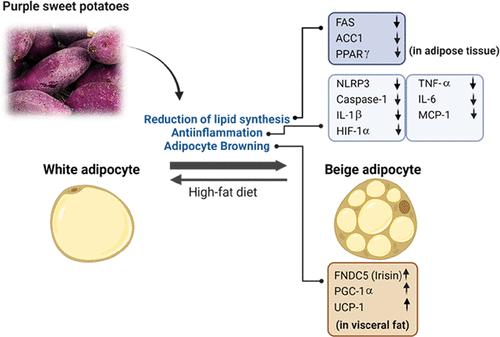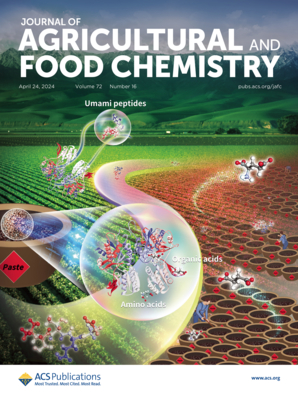Purple Sweet Potato Ameliorates High-Fat Diet-Induced Visceral Adiposity by Attenuating Inflammation and Promoting Adipocyte Browning
IF 5.7
1区 农林科学
Q1 AGRICULTURE, MULTIDISCIPLINARY
引用次数: 0
Abstract
Accumulation of visceral fat has been reported to increase systemic inflammation. Purple sweet potato (Ipomoea batatas L., PSP), known for its anthocyanin content, potentiates in mitigating oxidative stress. This study aimed to investigate the underlying mechanisms by which PSP influences body fat deposition. Five-week-old male Sprague–Dawley rats (n = 5) were fed a 43% high-fat diet (HFD) for 2 weeks to induce obesity, followed by 19 weeks of HFD supplemented with 5% PSP. PSP significantly improved body weight and reduced visceral fat mass and adipocyte size. In visceral and subcutaneous adipose tissues, PSP significantly downregulated proteins of FAS, ACC1, and PPARγ with inflammatory markers TNF-α, IL-6, and MCP-1. PSP reduced the proteins of inflammasome components, NLRP3, caspase-1, IL-1β, and HIF-1α. PSP increased the proteins associated with adipose tissue browning, FNDC5, PGC-1α, and UCP-1, particularly in visceral adipose tissue. In conclusion, PSP effectively reduced visceral fat accumulation, attenuated inflammation, and promoted adipocyte browning.

求助全文
约1分钟内获得全文
求助全文
来源期刊
CiteScore
9.90
自引率
8.20%
发文量
1375
审稿时长
2.3 months
期刊介绍:
The Journal of Agricultural and Food Chemistry publishes high-quality, cutting edge original research representing complete studies and research advances dealing with the chemistry and biochemistry of agriculture and food. The Journal also encourages papers with chemistry and/or biochemistry as a major component combined with biological/sensory/nutritional/toxicological evaluation related to agriculture and/or food.

 求助内容:
求助内容: 应助结果提醒方式:
应助结果提醒方式:


